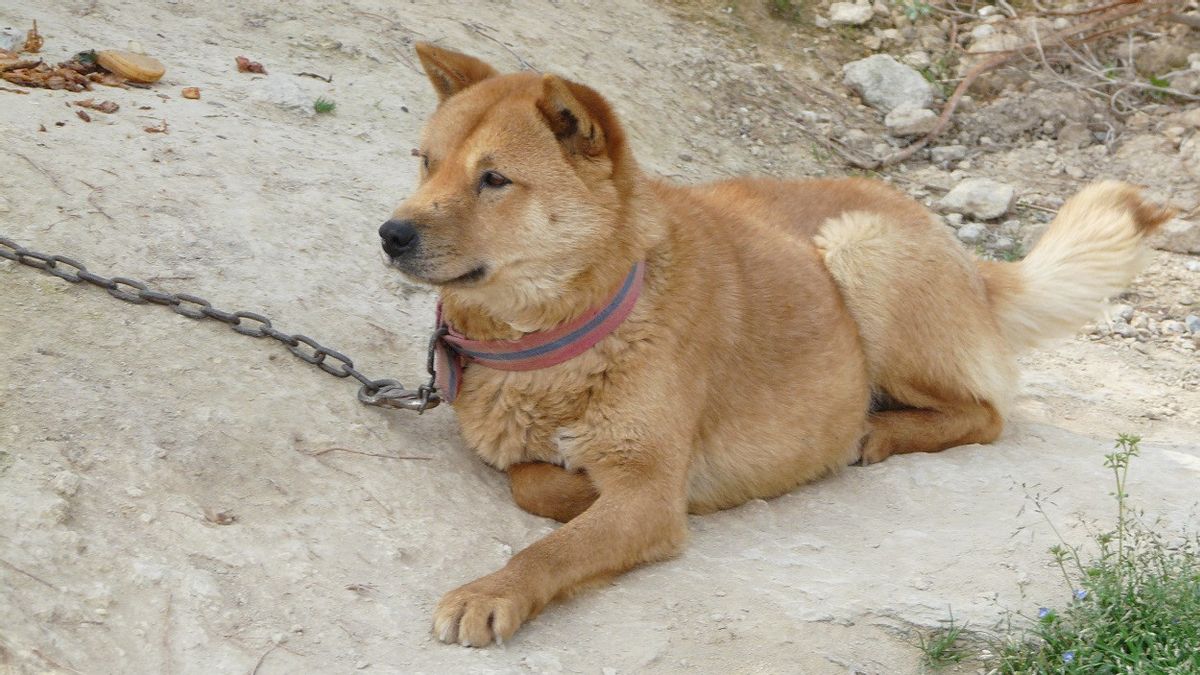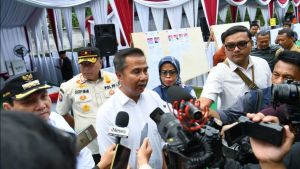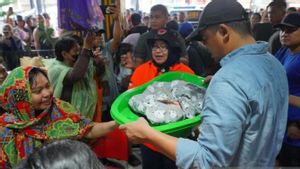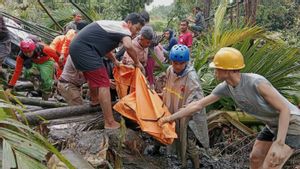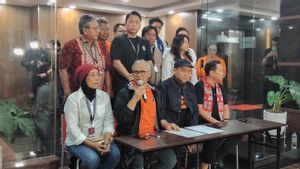JAKARTA - Russell the dog was once destined to become food because he was locked up in a dirty wire cage at a dog meat farm in Jeonju, North Jeolla Province. However, his fate changed after being rescued last October, and he was flown to Toronto, Canada to find a new family three months later.
Russell was one of 110 dogs rescued from dog meat farms across the country last year by the South Korean office of Humane Society International (HSI), an animal rights group based in the United States.
The rescued dogs were flown to the United States and Canada for adoption overseas between January 14 and 18.
Boarding the last flight scheduled for January 18 where 18 dogs were rescued together from a dog meat farm in Jeonju, North Jeolla Province. They arrived at the quarantine area at Incheon International Airport by truck.
Whining and shaking, with flattened ears and tails tucked between their hind legs, the dogs underwent quarantine, after which they were transferred to the cargo area.
Nara Kim, a campaign manager at HSI, scribbled with a marker on the chest, 'cute', 'beautiful', 'shy', 'gentle', 'scared', and 'I might need a little time', describing each dog personality, to her fellows who will greet them in Toronto.
She then cleared their chests one by one and packed them with food and water in preparation for the long-hour journey.
"The dogs leaving today are all very sweet and none of them aggressive. And fortunately, they are all in stable condition for the flight. After landing in Toronto, they will travel by bus to an HSI-affiliated shelter in Montreal", explained Kim, launching the Korea Times on January 24.

After bidding farewell to local activists, the dogs embark on a long journey to a new life, leaving Korea's dog meat industry behind them.
However, they will not be available for adoption as soon as they arrive in Canada, Kim said, as the dogs will need time to adapt to the new environment.
"They will be ready for adoption after receiving the necessary veterinary care, rehabilitation, and behavioral evaluations at the shelter. Depending on the individual dog's personality and health condition, the process may take several weeks to months."
"But I believe in the end, they will all be able to find a permanent family."
Kim, who has visited more than 20 dog meat farms in Korea, said dogs come in all sizes and breeds.
"Unfortunately, the big ones have almost zero chance of finding new owners in Korea, as people here prefer smaller breeds. And sending them to overcrowded local shelters is not an option. So for them, we have arranged overseas adoption in the US, Canada, and the UK", he said.
Since 2015, the organization has sent about 2,500 dogs overseas, of whom, 95 percent have found new families, she said.
As the dog meat industry in South Korea declines, local dog meat breeders are increasingly trying to leave the industry for a more profitable and sustainable future.
By supporting these farmers since 2015 through the "Model for change" campaign, the HSI Korea office has successfully closed 17 dog meat farms, as well as the Gupo Livestock Market in Busan, the city's largest dog meat market.
Through individual contracts with farm owners, in exchange for closing facilities and handing dogs over for adoption, NGOs offer financial support to farm owners to help them transition into new professions.
Kim said, "Farm owners themselves know very well that the dog meat industry is waning. They are desperate for an exit strategy, but they don't know how to start a new career at their age."

Some 17 farm owners who have participated in the campaign so far have gone into other sectors such as delivery, truck driving, construction, and vegetable farming. Kim added that the contract specifically barred them from re-entering the animal industry.
HSI views such a campaign model, if extended to a government-led level, could be a viable solution to the controversial issue of stopping the practice of eating dog meat in Korea.
Despite continuous rescue efforts from animal rights organizations, an estimated 1 million to 2 million dogs are still kept on more than 3,000 farms across South Korea, spending their entire lives locked up in dirty little cages without proper food or care, watching helplessly other dogs die.
"As a non-profit organization, we are unable to provide sufficient financial support to any individual who chooses to leave their dog meat farm. So we plan to actively propose our program to be reflected in the government's plan to phase out the dog meat industry, which should include providing necessary support to farm owners", Kim said.
To note, after decades of debate over a ban on the consumption of dog meat, the discussion has gained momentum, following the launch of a joint task force set up by the government last month.
The task force, consisting of officials from the relevant ministries of the Ministry of Agriculture, Food and Rural Affairs, and the Ministry of Food and Drug Safety, plans to collect data on current dog meat consumption practices, involving research on dog meat farms, abattoirs, markets, and restaurant.
"It is very encouraging that the government has launched a pan-government task force. We see this as a big step forward", Kim said. But at the same time, she pointed out that the authorities should come up with a detailed roadmap.
VOIR éGALEMENT:
Kang Dong-yoon, an official at the Ministry of Agriculture who heads the task force, said his party aims to make meaningful progress in the first half of the year.
"We are conducting site inspections in collaboration with local governments. Officials are visiting dog meat farms, markets, and restaurants. We will also conduct a nationwide survey soon, to gather public opinion", he told the Korea Times.
He also added that a government-led committee consisting of experts and representatives from the dog meat industry and animal rights groups met regularly.
The English, Chinese, Japanese, Arabic, and French versions are automatically generated by the AI. So there may still be inaccuracies in translating, please always see Indonesian as our main language. (system supported by DigitalSiber.id)
